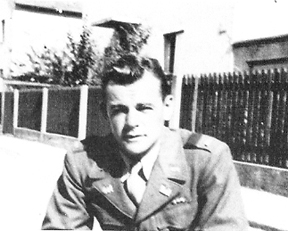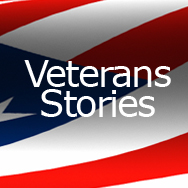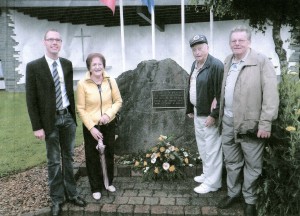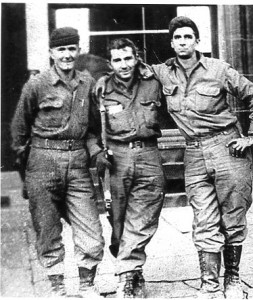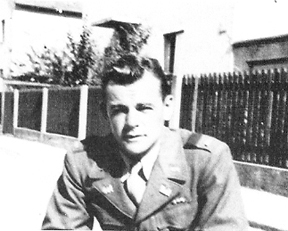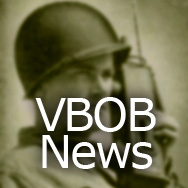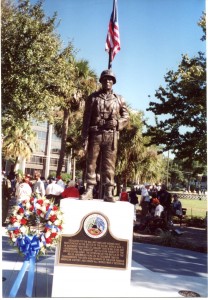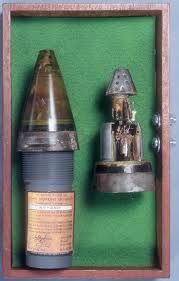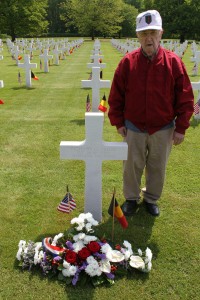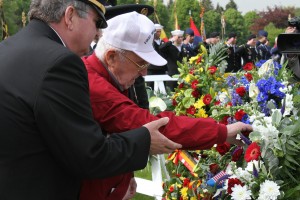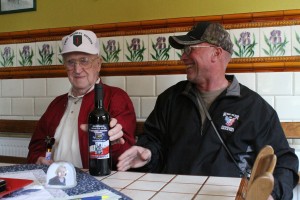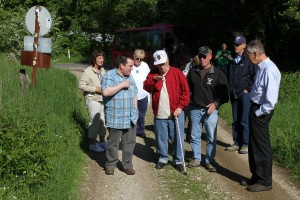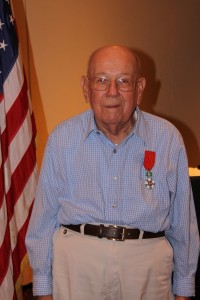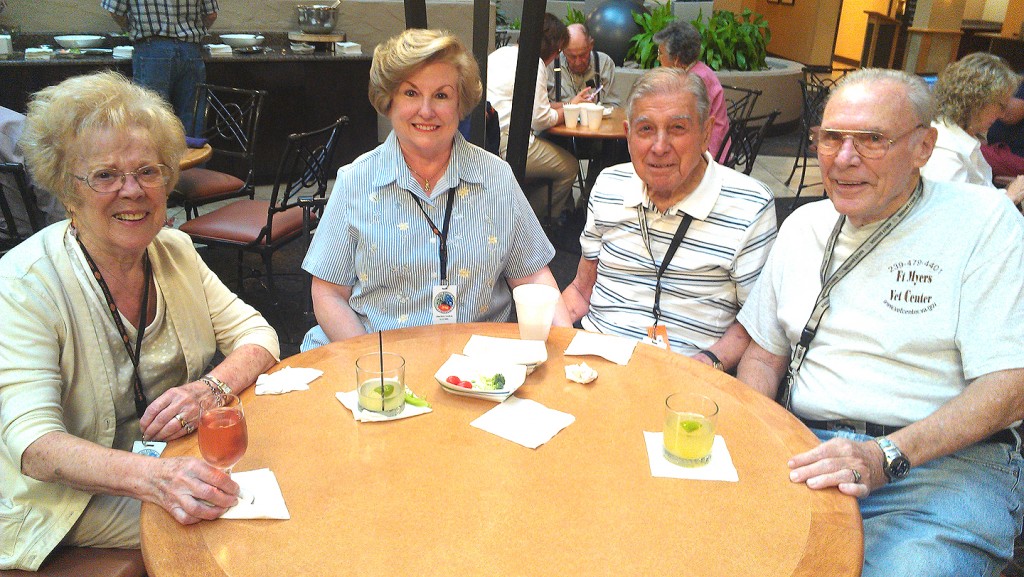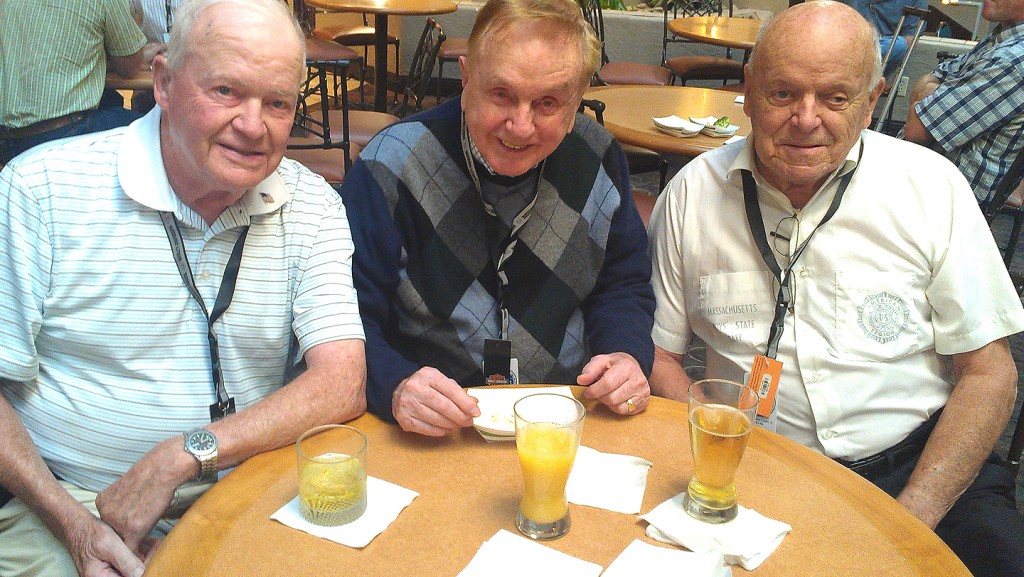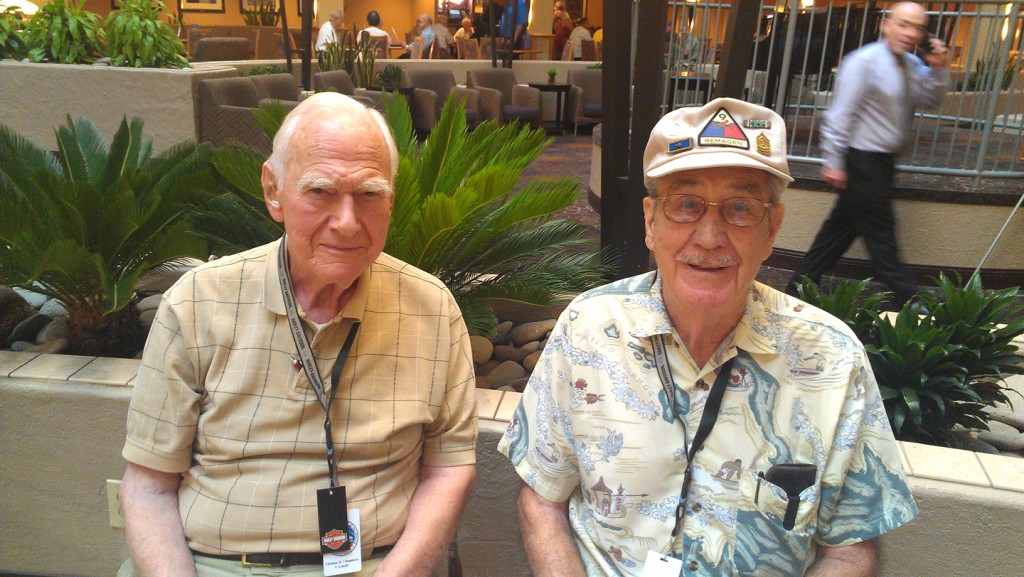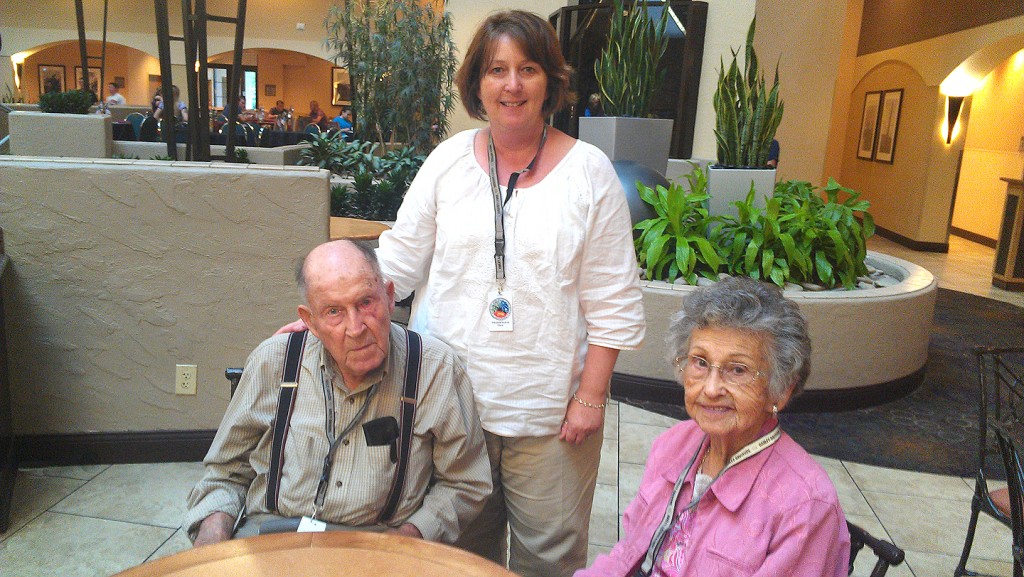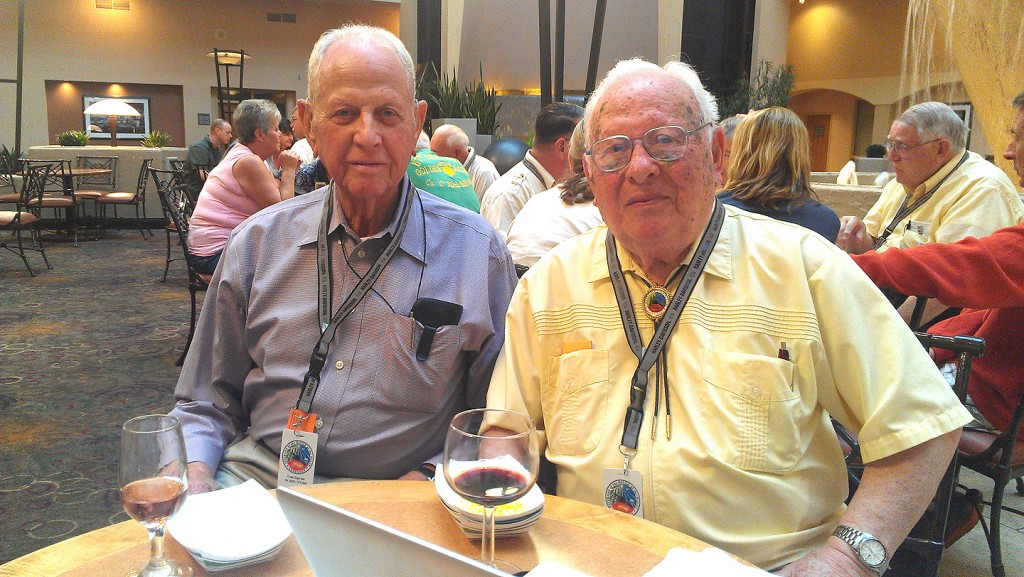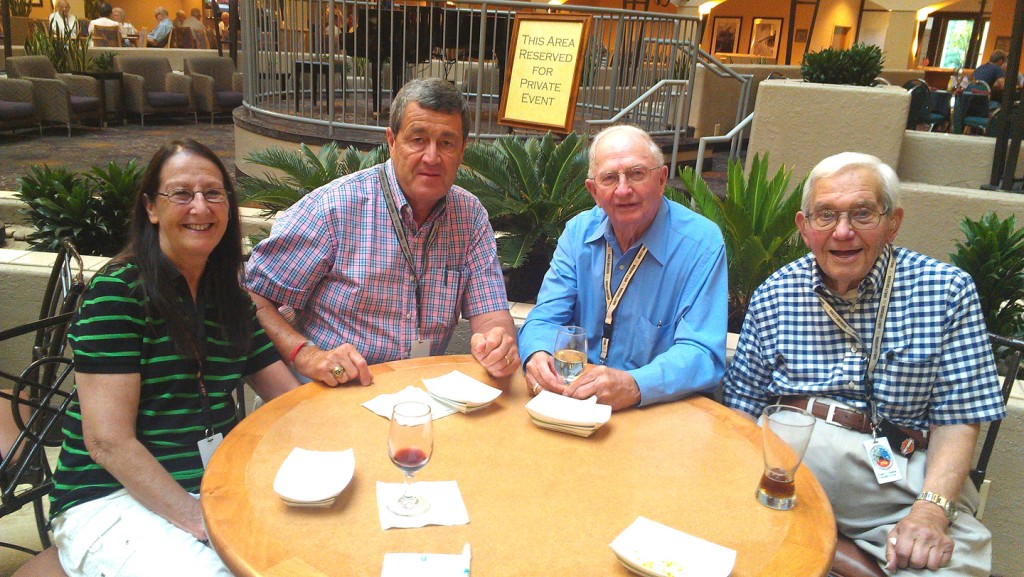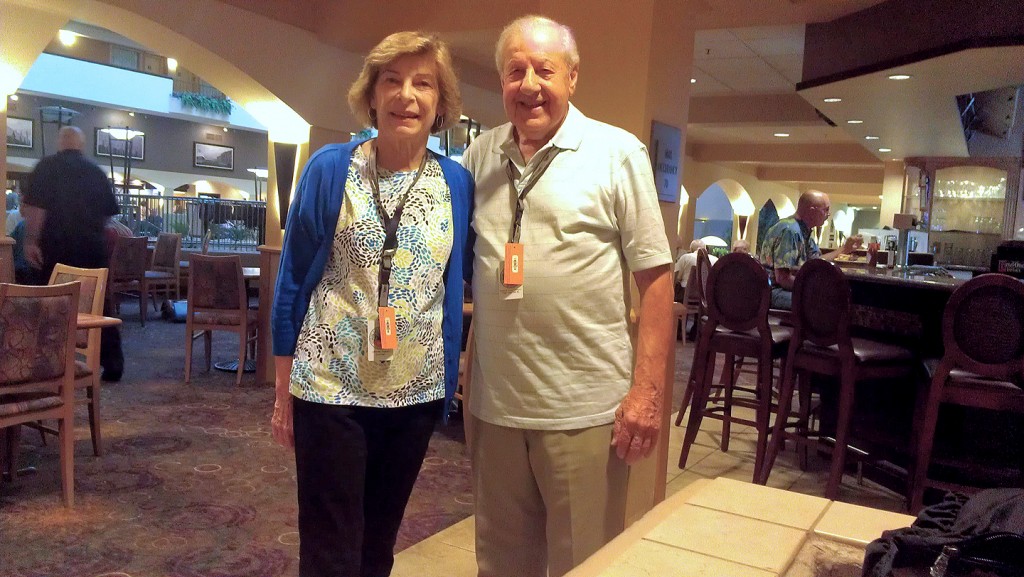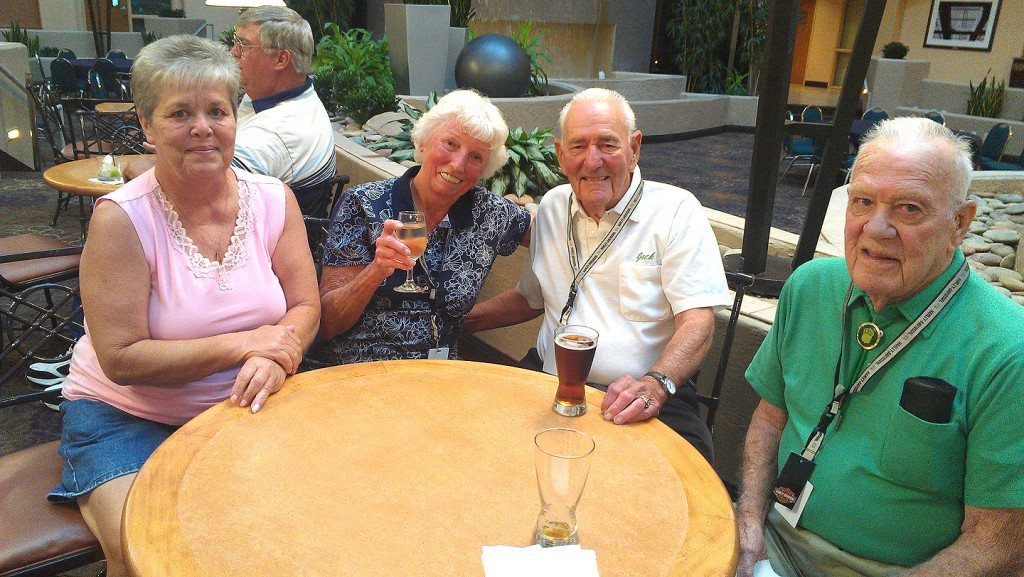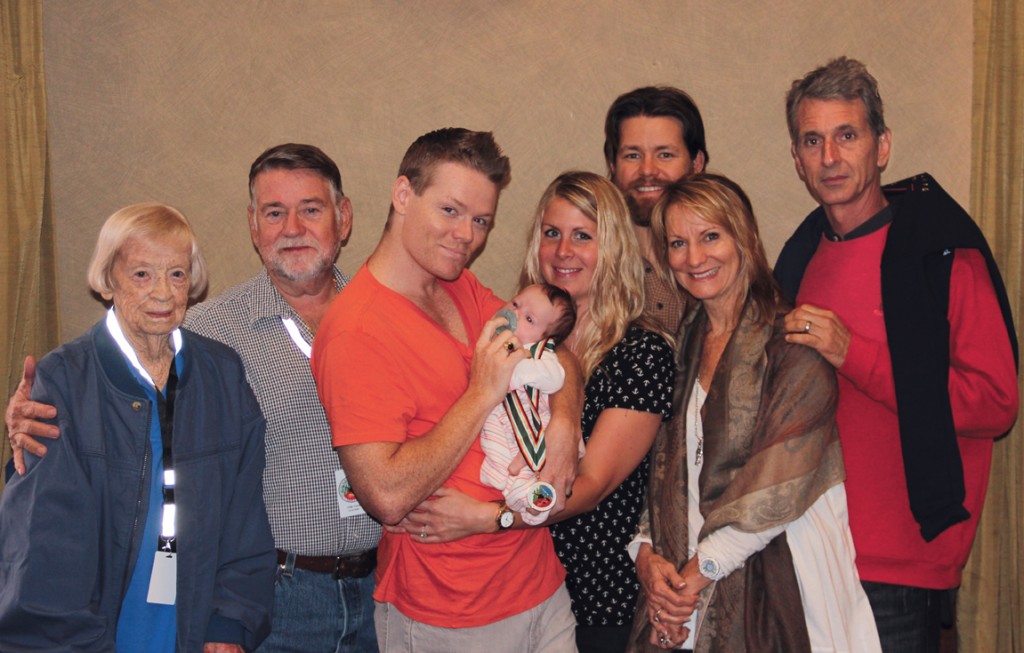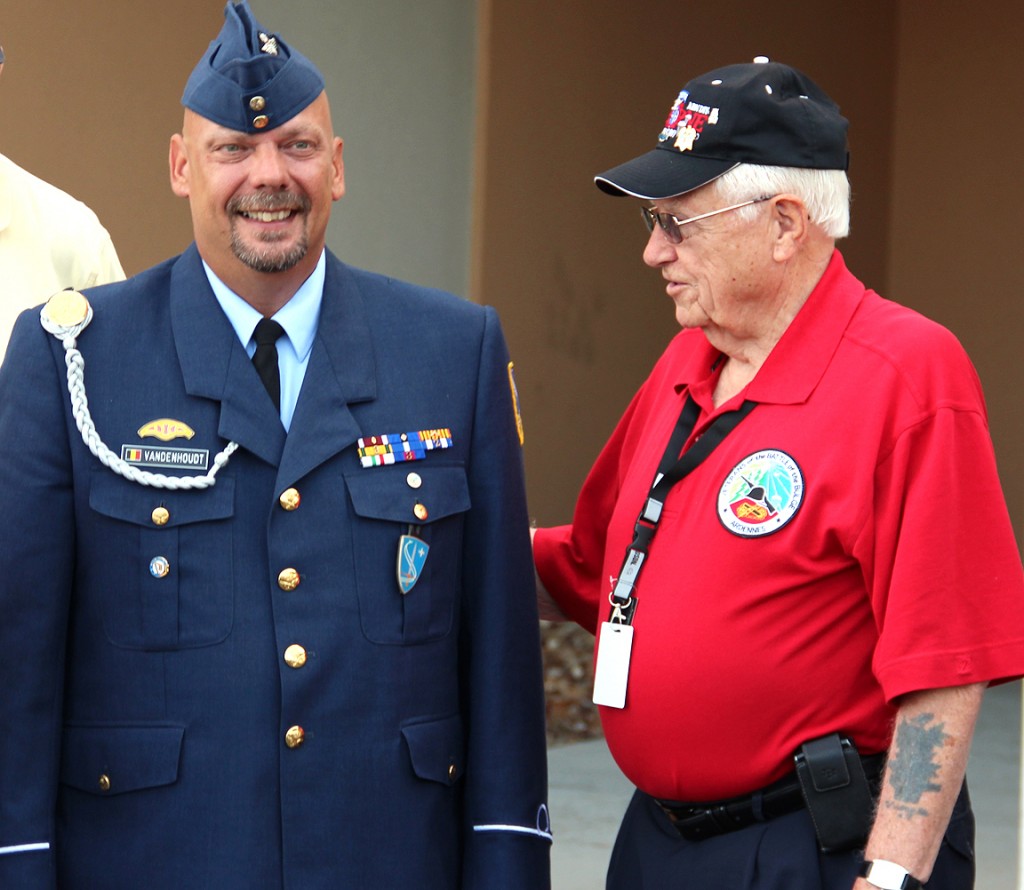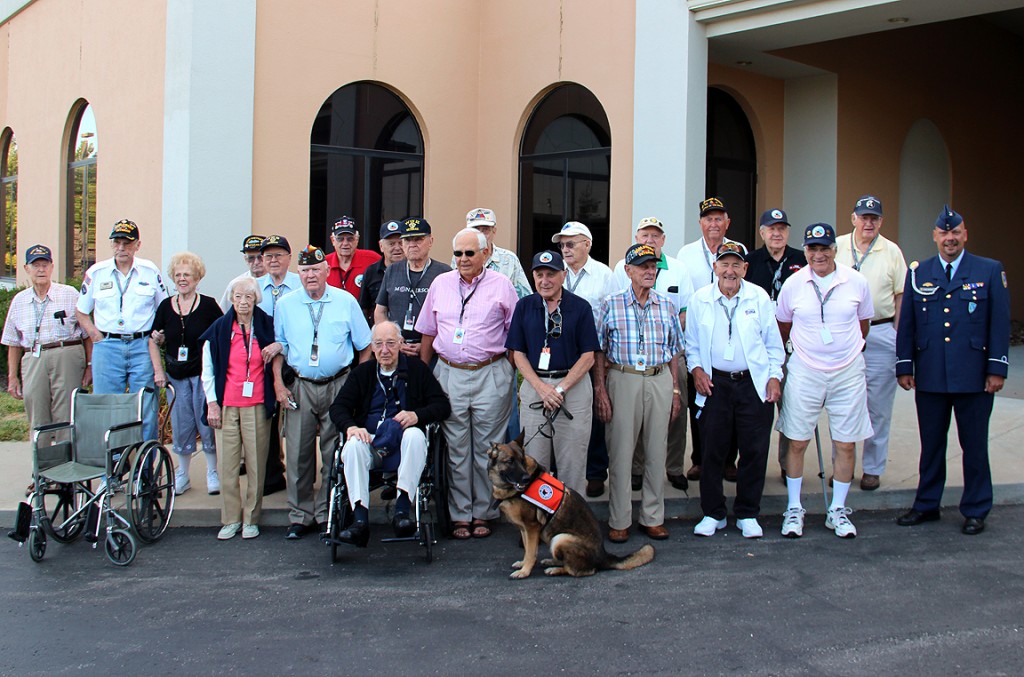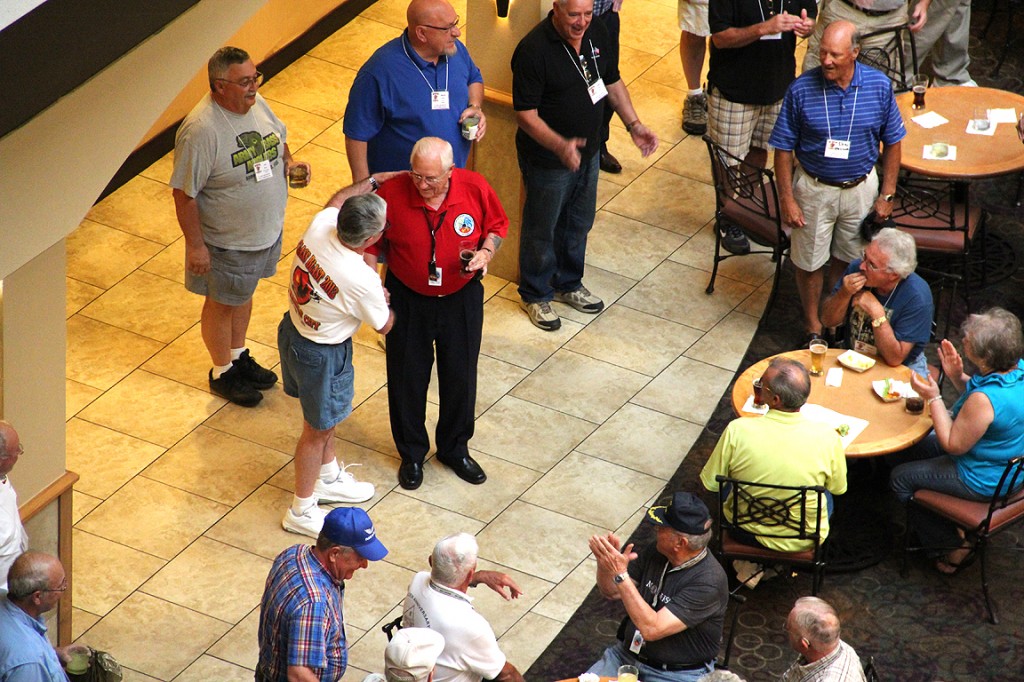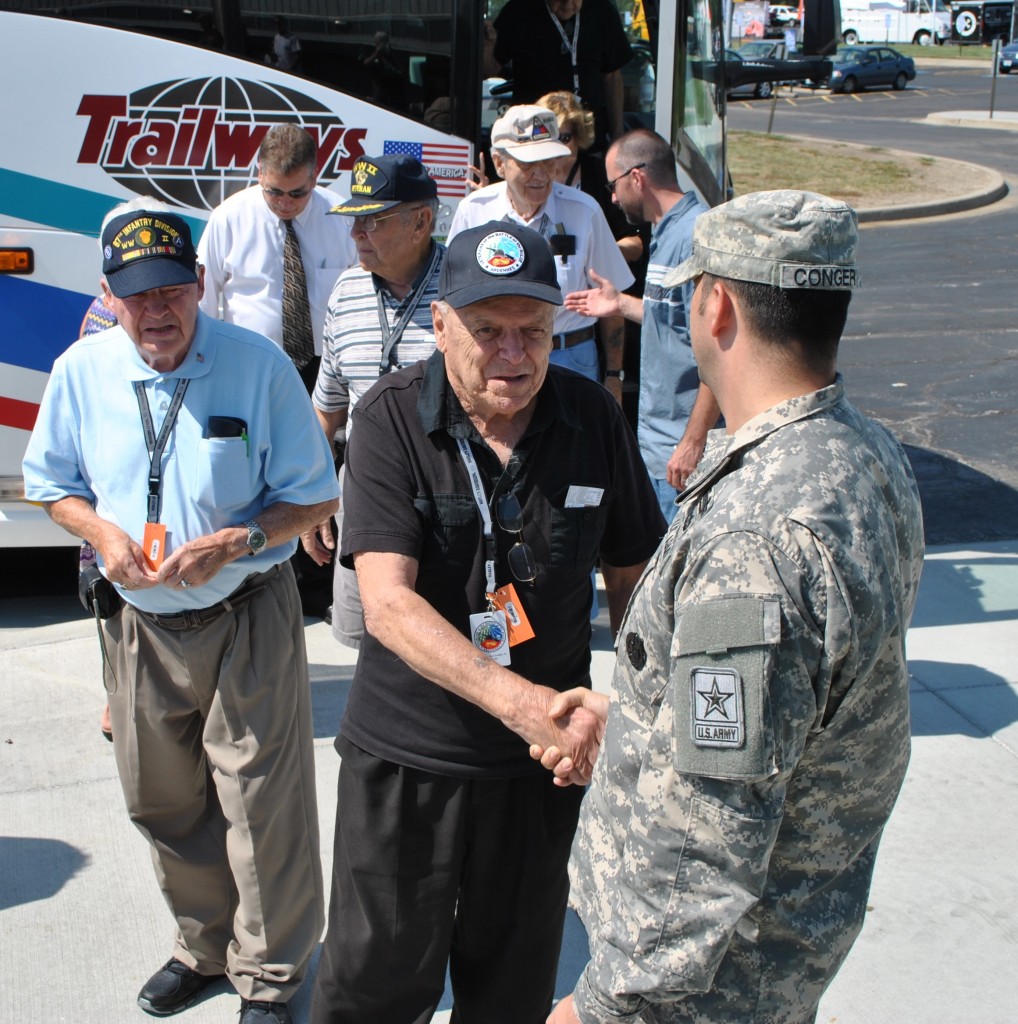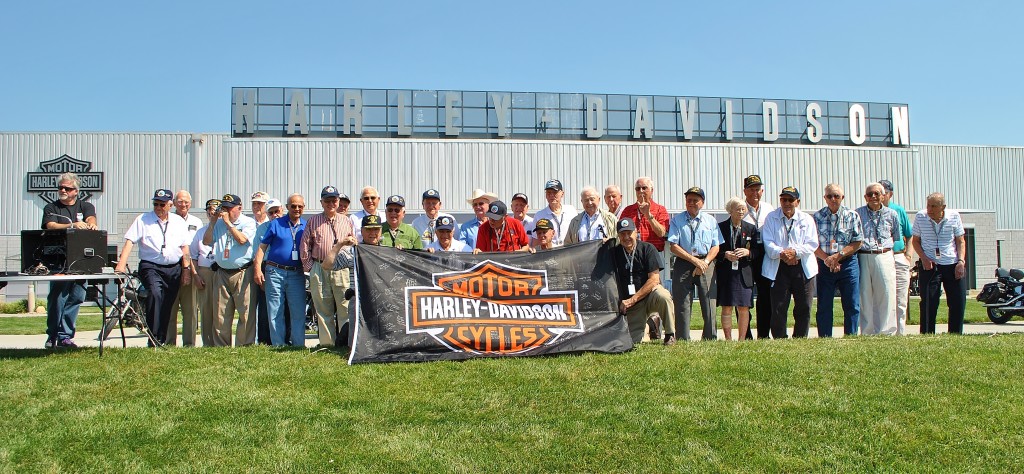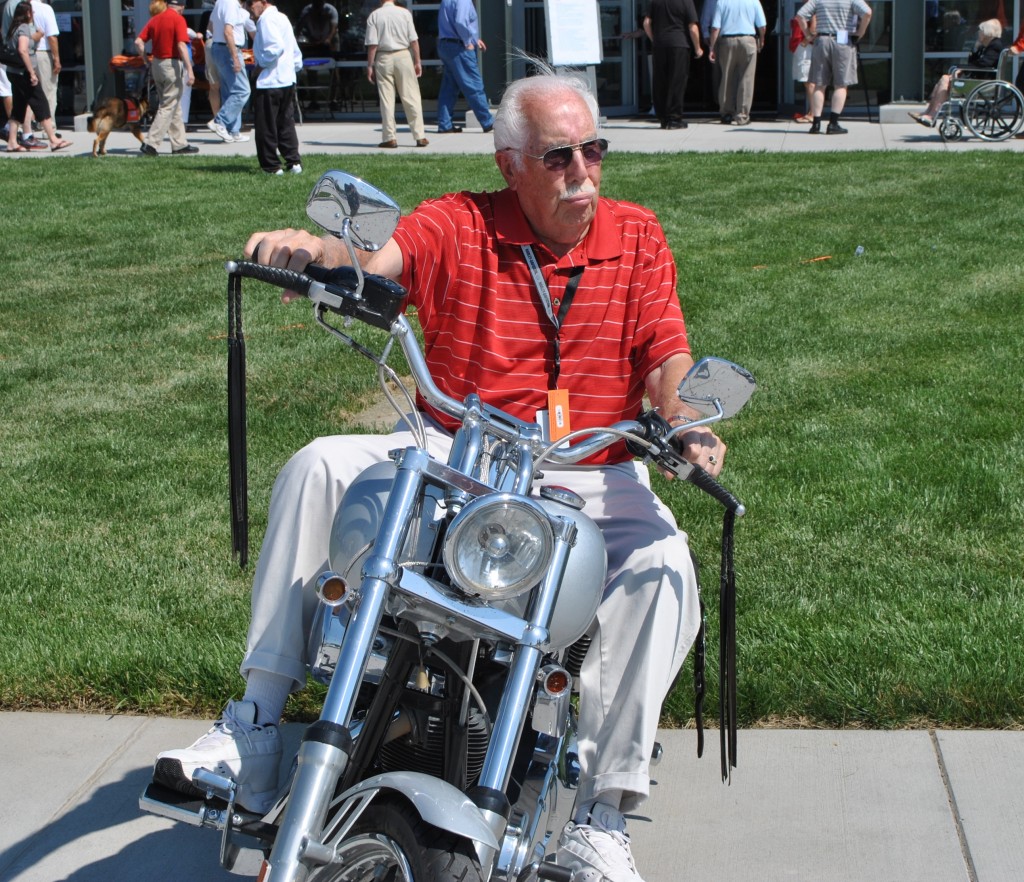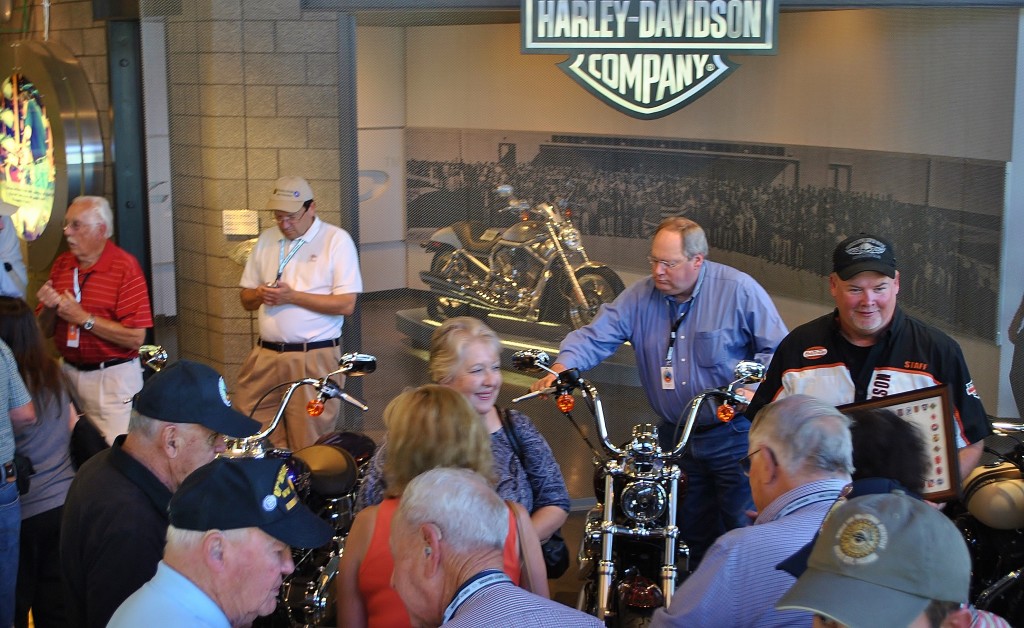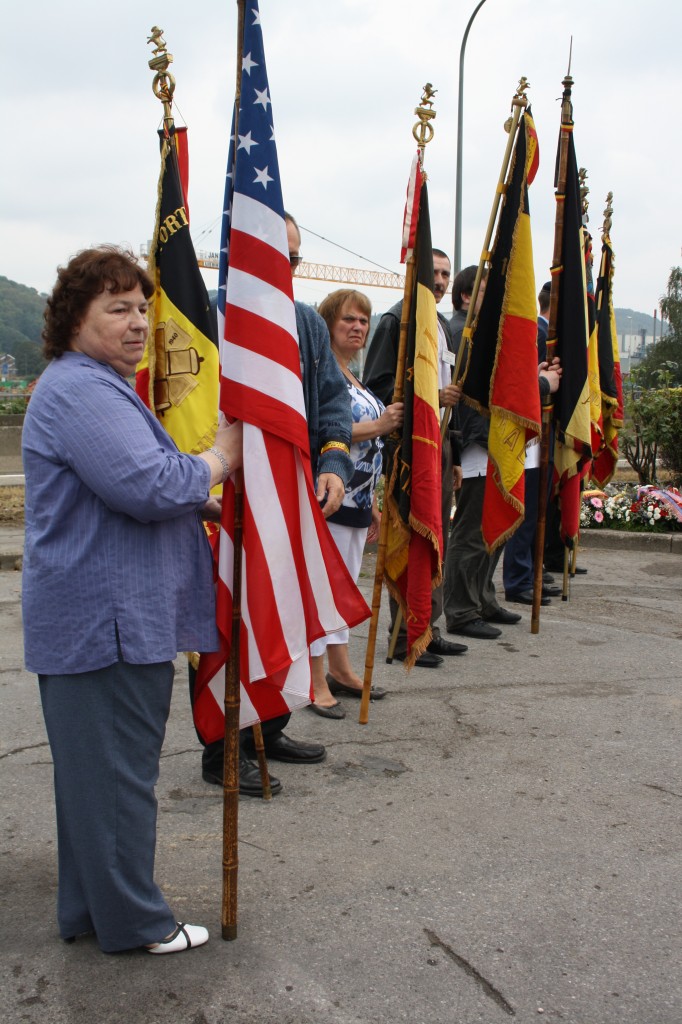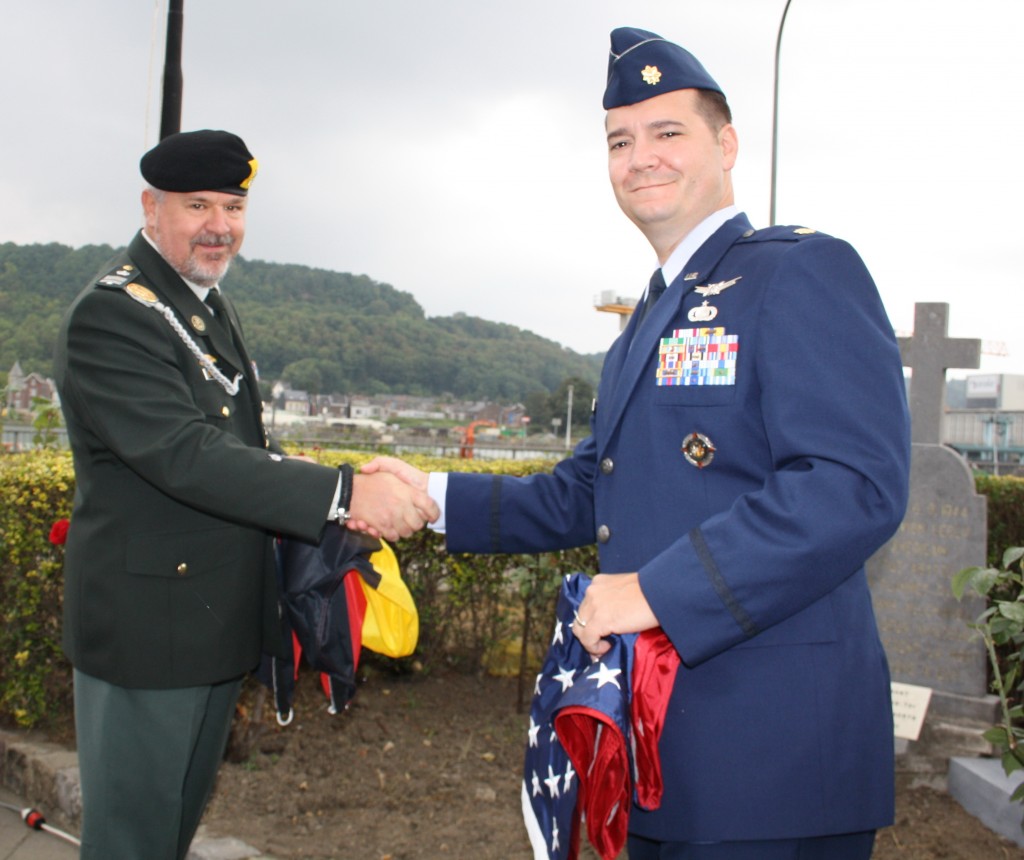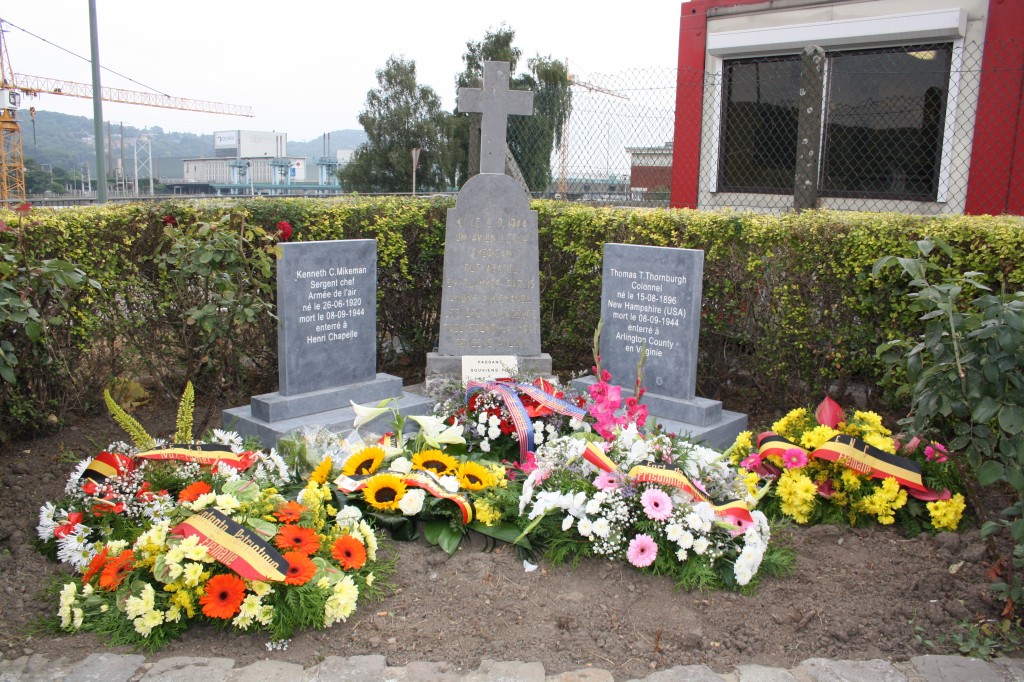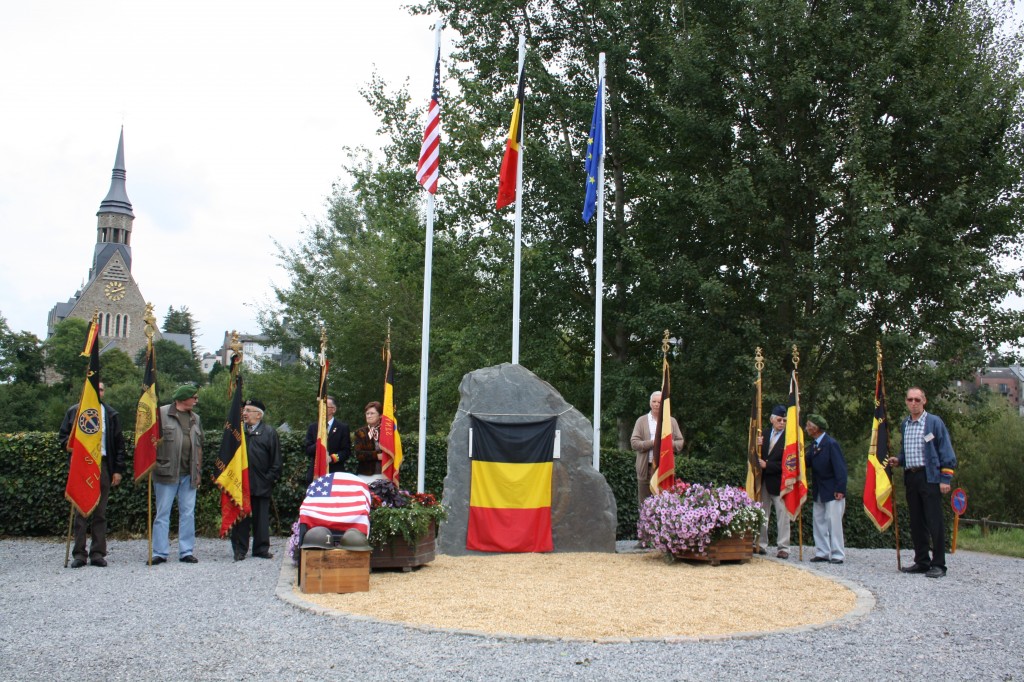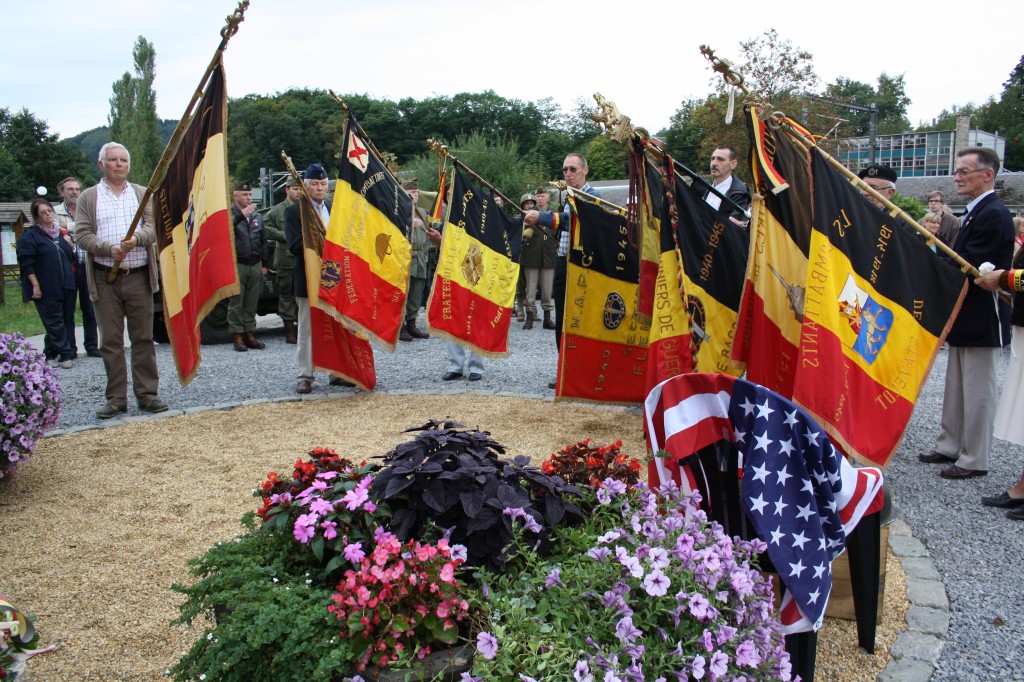G.G. Cooper was born on 11 July 1923 in Lafayette, Tennessee. C.G. decided to leave home after graduating high school to wander America. He ended up becoming a welder at Kaiser Shipyards in California. The draft board finally caught up with him and on 28 June 1943, just shy of his 20w birthday, G.G. was inducted into the United States Army . He went through basic training at Camp Lee, Virginia and when asked by the Army what he wanted to do, G.G. basically said ‘anything but cooking’. Needless to say, G.G. wasn’t laughing-when he was told that he’d be designated as a cook and would go through Bakery & Cook School. He graduated from Bakery & Cook School as a 1st cook and told he would be behind the front lines with plenty of food and warmth and placed in Company E, 289th Infantry Regiment , 75th Infantry Division.
G.G. was supposed to be quartermaster but because of his excellent marksmanship and
the need for more men to fight the elite German forces wreaking havoc on the European front, was chosen to be on the front lines as a rifleman. Wherever his company went, G.G. was either fighting alongside them or cooking food for them. G.G. received further training at Camp Breckinridge, Kentucky and went overseas from there. He recalled when they gave the 1st cook position to another guy who knew nothing about cooking, much less for an army of men! The new guy asked G.G. the proper amount of beans to prepare for all the men. G.G. told him to figure it out since he was now the cook and especially since he was receiving sergeant pay (G.G. was a Pfc).
The sergeant cook, as I will call him, cooked 30 pounds of beans for 200 men, when only 14 pounds were needed! Beans, beans, and more beans! The company of men the sergeant cook prepared them for were none too happy with his lack of portion control, as they had to eat them for every meal over the days that followed until every last bean was gone! This was due to the fact that the food was considered Army property and improper disposal of Army property could lead to being court-martialed!
Around this same time period, G.G.’s wife Patricia who was back in Knoxville, Tennessee, was about to give birth. She was a very small lady and the doctor was concerned that she might have difficulty during the delivery. Like any concerned husband and soon to be papa, G.G. wanted to be with her. He was told that if he left he would be court-martialed. This warning did not deter him. Instead, G.G. made his way to the Red Cross and asked permission to go telling them that if they denied his request he would climb the walls and go anyway.
The phone rang and it was the doctor in Knoxville saying that G.G. needed to come immediately. They finally gave him permission and he began his trek by hitch hiking. At one point he was stranded in the rain. Thankfully someone stopped and offered him a ride. Unfortunately the vehicle was a motorbike. G.G.’s brother had been injured whileriding one so he was a bit apprehensive. He ended up accepting the offer however. He got off in Nashville where his father lived and then caught a bus on to Knoxville. G.G. was supposed to be back on the base that Sunday, but decided to stay in order to hold his baby in his arms. (All had gone well with the delivery.) Of his decision to stay he said, “I didn’t know if I’d live to ever see him again or not.”
On Monday he got orders to go to HQ as he was considered to be AWOL. G.G.’s service record indicates his one AWOL, but it was a decision he never regretted. His son was two weeks old when he left for the battlefields from New York on 22 Oct 1944. His ship arrived at in Liverpool, England on 3 Nov 1944. The men then traveled on to South Wales and finally crossed the channel to France. Once on French ground the men headed to Paris where G.G. says they were treated like heroes. Then it was on to Bastogne, Belgium where they spent their first night in battle with the enemy. This brutal battle would become known as The Battle of the Bulge.
Despite the area having its coldest winters on record up to that time, Allied leaders chose not to send appropriate winter clothing with G.G. and the other men, saying that they would only be involved in a few skirmishes. These leaders were wrong and their decision could have spelled disaster for the Allies. Fortunately our men pulled through like the troopers they are. The men were given C and K rations so there would be no need for cooks on the front lines. G.G. was put in charge of guarding the kitchen and ammo truck on the first night while the other men were enthralled in battle. The driver of a jeep came up to him saying that a German tank was headed his way and not to let it through.
“What will I do?” G.G. remembers thinking back then. Ideas began swirling in his mind… .the .45 pistol on his hip… his rifle. He grabbed a carbine, machine gun, bazooka, grenades, and ammo belts from the truck he was guarding. “I was a walking arsenal”, he said. The ideas continued in his mind… a grenade… no, that won’t work… a Molotov cocktail… no, that won’t work… blast it with a bazooka (he recalled watching a training film that showed a bazooka being used to blast the tracks off a tank)… no, I have no ammo for it. At this point, the tank is right in front of him and his mind is frozen. In the chaos, G.G. slipped falling in the tanks’ path due to the slick mud. Providence was with him as the tank rolled right over him, straddling him and continuing on its path.
The next morning he found out that some of his buddies had been killed. G.G. said it was a gruesome sight, the bodies strewn about the battlefield’, the Germans had succeeded in surrounding them and they were now cut off from replacements and supplies. G.G. ate dry hog bran from a farm and was happy with that discovery. He also managed to find a turnip in the root cellar. Another group of the Allies eventually pushed the Germans back and rescued the previously surrounded men. They regrouped and received replacements, some of whom were only teenagers. On Christmas Eve and Christmas Day 1944, a heavy snow had covered everything and G.G. said it was a beautiful sight to behold. Suddenly all heck broke loose with dogfights in the sky and heavy artillery shelling on the ground. He never forgot that Christmas Dav.
At one point, G.G. was sent to the hospital due to his frostbitten toes. This was a common occurrence with the lack of appropriate clothing for the extreme weather conditions. While lying in his hospital bed, the soldier on one side said to the soldier on G.G.’s other side, Joe, I’m dying. Tell my folks how much I love them. G.G. later found out that the two men had fought alongside the Russians who had given them poisoned liquor for some reason. (After a while, soldiers would call one another Joe because by the time you learned someone’s name, it seemed you died or they did.) The soldier who asked his buddy to give the message to his parents, died later that day and his buddy soon suffered the same fate, blind and calling out for loved ones.
That same morning, soldiers were lined up to be seen by the doctor. Many of the men were there for frostbite and the doctor told most that the affected appendages needed to be amputated. When it was his turn, G.G. put his hand up to jaw and moaned. The doctor asked what was wrong with him and he said he had a toothache. The doc told him that he was in the wrong line and off G.G. went. He remembers thinking, “I came over here with all my body parts and IF I get to go home, I wanna go home with all my body parts… all together.”
From the hospital he hitchhiked back to his outfit. He went to the kitchen truck and told his company commander that he had been on the front lines and knew what it was like. “If you’ll give me permission to have a truck and driver, I would like to take hot chocolate and donuts to my buddies in the foxholes.” Permission was granted and G.G. began making preparations. “While making up the donuts the tent was hit. There was shrapnel all in the donut mix. I picked it all out and continued on,” G.G. shared. He fried the donuts and prepared the hot chocolate, the latter which he put into insulated containers to keep it hot. The refreshments were loaded on the truck and the two men headed to the front lines. On the way there they were caught in the crossfire between both sides. There were bullet holes in the hot chocolate and the truck, with hot chocolate spilling everywhere. G.G. was in the back sliding around with the containers. Thankfully neither he nor the driver was hit.
The driver soon stopped, having taken C.G. as close to the front lines as he could get him. He told the driver it was fine as he knew where the fox holes were located. G.G. carried the refreshments to each of the fox holes and they were sure a welcomed treat. The men would hold out their steel helmets and G.G. would pour in some hot chocolate and throw in some donuts. Mind you, the soldiers’ helmets were a versatile tool. Not only did they protect their heads or hold food and drink, but they were also used by the soldiers to relieve themselves so they wouldn’t have to leave the safety of their fox hole.
After serving everyone, G.G. made his way back to the truck. The driver said that they were going a different way back since they had come under fire on the way up. It was dark and there was no GPS for them to conveniently use. Suddenly the driver shouted, ‘We’re behind German lines! Look at all those Krauts! What do I do now?’ G.G. told him to push in on the clutch and the .gas at the same time to make the engine roar. The driver did so and G.G. threw his arm out the window saluting Hitler and yelling, “Heil Hitler! Comrade, Comrade.”
Once again Providence was on their side as the Germans actually allowed them to pass through safely. Eventually the two men made their way back to camp where they told of what happened. Some of their fellow soldiers were unsure whether or not to believe what they were hearing. A few days later, the 75m captured some of those same German’s and asked them why on earth they had allowed the Americans to pass. The German’s response, ‘We didn’t know what you darn yanks were up to.’
After awhile, the 75th and others were pulled back from the front lines and billeted in Belgian homes for a rest. At the home G.G. stayed in there was a pot bellied stove. “Oh I could not wait to get my boots off,” G.G. said of his delight at having a stove. His feet were so swollen that he couldn’t get his boots off. The ladies of the house offered to assist him and were eventually successful after much tugging and pulling. Immediately they saw how black his feet were. They would each get under one of his arms and walk him outside to wash his feet over and over again in the snow. “Thanks to those ladies I still have my feet and toes,” G.G. said of their nursing care.
Communicating with the Belgians was difficult and it was only through hand signals and motions that they were able to understand one another. He was asked his name and told them Cooper. They said ‘Jackie Cooper’ (American Actor) and he nodded uh-huh (the two men were the same age and build). The women went into town telling everyone they had a celebrity in their home. Everyone came over with writing tablets wanting an autograph. “What else could I do? They had been so good to me, so I signed ‘Jackie Cooper’,” he said of the experience.
A 90-day wonder (second lieutenant), as the men would call them, decided that a kitchen truck would be put on the front lines and serve hot food to those in the foxholes. “We didn’t think that was too bright of an idea but after all, he was our officer,” said G.G. Snow was everywhere and the kitchen burners weren’t working properly. He had to take them outside and tinker with them. During this time, some of the fuel spilled out and caught fire. There they were in the Ardennes forest with flames shooting up through the trees giving away their position. Heavy artillery began to rain down on the men, busting trees to pieces and causing them to become spears hurling at incredible rates of speed hitting some of the men. G.G. took cover behind the kitchen truck and thankfully was not hit. Unfortunately the second lieutenant who put the kitchen trucks on the front lines was hit. G.G. never saw him again and believes he didn’t make it.
G.G. made another trip to the hospital, this time for a bleeding nose and lips. His nostrils were extremely swollen and he couldn’t breathe through them. At hospital they put him in a barber type chair then placed hot towels on his head and a curved steel cup below his ears and mouth. To thaw him out they placed long steel rods up his nostrils and switched out the towels as they cooled with fresh hot ones. All kinds of bloody ‘corruption’, as G.G. called it, came oozing out his facial orifices until finally he could breathe better. His breathes were still shallow so they wrapped up his chest with an adhesive tape bandage and let him go. Just outside the hospital was a gully which G.G. tried to jump. He was unsuccessful and fell in. Thankfully someone saw what happened and carried him back into the hospital where they loosened his chest wrap a bit.
G.G. told of a facility the soldiers entered that appeared to be a slave labor camp. Nude bodies were lined up 4 – 5 feet high and roughly 20 feet long. “What a horrible sight,” G.G. said, “Some were barely alive…just skin and bones, didn’t have the strength to move. They were a pitiful sight.” One of the camp guards had a pistol and whip on his hip that was likely used on the prisoners. G.G. relieved him of his weapons and kept the whip as a souvenir. It wasn’t long before G.G. became disgusted with the whip and the pain it had induced on innocent people so he got rid of it. He said of the item, “I got sick of that whip and what it had done. I did not even want it as a souvenir, its bad memories.”
G.G. spoke of the mental effect the war had on many of the soldiers, “Some of the soldiers had seen so much horror that they became zombies of sorts. It was as if their spirit had already left their body. Some of them just kept on walking, on into enemy fire. I felt like when they did get shot down, they did not feel the pain of the bullet. They were not in that body anymore…their spirit had left them. Oh, how horrible.” He recalled another horrible experience, “One guy next to me had been hit pretty good. (It) left him like scrambled eggs. I waved my hands in the air and said, ‘Thank you Lord. Joe. No more cold. No more pain. … Why me Lord? Why am I still here?'”
The 75th pushed the Germans back and the medics headed out to help their wounded on the battlefield. Later on the next day or so, G.G.’s unit found their medics stripped of all clothing, tied to trees, and their bodies mutilated. Soon thereafter the 75th believed they had captured some of the Germans responsible for the mutilated medics. Recalling what happened next G.G. shared apprehensively, “It’s not easy to talk about the Germans were hollering ‘Mercy, Mercy!’ as they were cornered in a barn and the flamethrowers ending their lives as they hollered ‘Mercy, Mercy!’ They showed no mercy to our fellows Oh Lordy. How cruel a human being can be. one to another.”
Back and forth both sides pushed each other in the Ardennes. Dead German soldiers and American soldiers were piled up on top of one another, covered by the never ending snow. The bodies were frozen stiff. G.G. remembered when they did pick up their dead; they would throw them into the back of a truck like you would a log of wood. All piled up there together, Germans and Americans. In death it did not matter that the two had fought as bitter enemies.
One time when he went to eat his K-rations, he sat down on what he thought was a log. Something was sticking him in his bum so he began digging around in the snow to see what it could be. “It was a Germans belt buckle. I was sitting on a corpse,” G.G. said. He will never forget the bitter cold and ground frozen so hard you couldn’t even dig a foxhole. The men would sleep standing up. One wouldn’t think it possible but G.G. said that 4 of them would huddle together in a circle, putting their arms around each other’s shoulders and actually catch a few winks and maintain some warmth. He also remembers some of the men sleeping as. they were walking due to their extreme exhaustion. Being hungry at the same time didn’t help and they often stumbled, falling into the snow which became the final resting place of some.
On one night in the battle, G.G. heard someone holler real loud and then a shot was fired. A soldier had chosen to shoot himself in the foot rather than continue on fighting in hell. He was unable to convince his superiors that it was an accident because of him hollering before he actually shot himself. The soldier ended up receiving some bad time and going without pay for a spell. That night “so many of us got killed,” said G.G. Many officers were among the dead and some of those who made it through told-G.G. Thev were going to make him a second lieutenant. G.G. wanted no part of it because so many of the officers died. Another soldier ended up receiving the promotion. G.G. laughed as he said, “Would you know that sucker made it through every battle fought from then forward and made it back home.”
Near the Belgian barracks where G.G. was staying at the time, he came upon a cow and thought to himself, ‘I haven’t had milk since we left the states I’m an old farm boy… .I’ll just sit my gun in the corner and milk her.” He patted her on the head and called her Bessie in an attempt to calm her down and placed his steel helmet beneath her udders. As he milked her she continued to moan, which G.G. latter believed was because she hadn’t been milked in so long.
He successfully retrieved a helmet full of milk which he then placed in the snow to cool it. When he went to drink it some of the other soldiers said, ‘You’re not going to drink all that blanket blank milk yourself to which he turned up the helmet and began guzzling it. He continued with the story, “It was so good but it had no more hit my stomach than it came back out both ways. I was so sick! That milk wasn’t fit for human consumption because poor old Bessie had it in her bag for so long that it had become contaminated.”
As the men managed to push the German’s back once again, they moved forward gaining ground. They came upon a huge beautiful home and G.G. wondered if he might find any dry, clean clothes inside. He and a buddy went to check it out but he couldn’t find any men’s clothing. “There must have been a great big ole woman living there ’cause I found a great big ole pair of bloomers.” He began to laugh as he recalled what he did next, “They were clean so I put them on. I also found a petticoat and put it on too.” This only illustrates how cold our men were.
His buddy hollered from across the room to look at what he had found. Lo and behold, that soldier had found a tuxedo and top hat. The soldier put on his find as well but left the top hat and off the two goofiest dressed soldiers went back into battle. G.G. couldn’t get the petticoat tucked into his britches so he just left it out. He said that the sight of himself and his buddy made him laugh uncontrollably at the time.
At one time the men were low on rations. One soldier who had been a butcher at a packing company in civilian life told G.G. that the two of them should go out that night and butcher the cow. G.G. thought it a great idea and the two headed out in a Jeep to procure the meat. G.G.’s buddy took his position in front of the cow, raised his knife, and took a good hard swing to cut the cow’s throat. Unfortunately, the young man managed to miss the cow and instead cut his own thigh. G.G. took over from that point, as he too had spent some time as a butcher, and slaughtered the cow. He then tied it to the Jeep and drug it into a nearby building where he butchered it. During that time, someone began knocking on the big metal door of the building. Thankfully, the person soon went away and G.G. was able to finish the task at hand. The men cooked up their meat and everyone wanted a portion, even the inspector general! G.G. knew that he and his buddy could have been court-martialed for their actions. However, they didn’t regret their actions and their buddies were sure thankful for a reminder of what real food tasted like instead their boxes of rations.
AT one point after the 75th had been fighting in the Ardennes for some time, the French needed help in Colmar, France. The men were loaded into ‘forty & eight boxcars’, which got their name during the Great War because they could carry forty men and eight horses. G.G. said they had a lot of men packed into those boxcars like sardines. G.G. was in the middle of the boxcar next to a big container used by the men to relieve themselves. “Oh Lord,” he said laughing, “I didn’t like sitting there.” He continued on describing his ride in the forty & eight saying, “I thought to myself, ‘If I could just work my way back to the corner of this boxcar, I could lean up against the side and rest my head and back. How nice that would be.'” So G.G. began shrugging and pushing, which the other men cussed and fussed at him for. Finally he made his way to the corner he had eagerly scouted out. He leaned back, putting his head to one side and all he could hear was ‘bump, bump bump, bump…’ There was no sleep for this soldier. G.G. remembered the train coming up off the tracks for a split second and then slamming back down.
That’s how the 75th crossed into France to fight with the French 1st Army, who had been struggling against the Germans, in the battle of Colmar Pocket. “Oooh boy. Those Germans really let in on. us,” recalled G.G. He was unsure if he would make it through the battle so he kept a picture of his wife and little boy next to his heart thinking that if he died, maybe they would bury him with it. He did make it through that battle and was awarded the Croix de guerre for his efforts. Food was scarce at times and one of the things the French soldiers would do was to put chicken coops on their armored tanks and then go out to local farms to gather whatever sources of meat they could find, including chickens and pigs. They would then put the animals in the coops and tie the coops back to the tanks, taking the animals into battle with them.
The men soon headed into Holland where G.G. says the war had been quite tough. He recalled a pub whose owners had left because of the intense fighting but who didn’t lock it up on their hasty retreat. The men went on in and enjoyed the variety and wealth of drinks and snacks to be had. G.G. snotted a radio set which he turned on to see if there was anything worth tuning in to. The broadcast just happened to be the Grand Ole Opry in Nashville, Tennessee. Uncle Dave Macon and his son Dorris were performing.
That same evening, in a big farm house, the men drew straws to see who would go out on a recon mission and report back where the enemy was and so forth. One of G.G.’s pals ended up as one that drew a short straw and that fella was downright angry about it. Not that he was trying to shirk his duty but rather because he had this nagging feeling that he wouldn’t make it back alive. In his eyes it was a death sentence. The soldier decided to write a letter home telling his family how much-he loved them and such. He asked G.G. to mail it, explaining the 6th sense about his death that he had. G.G. told him that he couldn’t send a letter like that and that he would safely return. The next morning, the rest of the men headed out and found the young man dead, his goodbye letter covered in blood. G.G. said he wishes to this day that he had at least gotten the contact info of his buddy’s family so he could tell them that story.
For roughly 7-10 days, the men fought in a fierce battle and finally made their way to the river Rhine. “Those combat engineers… .1 gotta give them credit,” G.G. said. They went up on the bridge and tried to repair it so the men could cross into Germany. G.G. would watch them at night Time after time he saw a body fall off the bridge and into the river below, having been shot by the enemy. On one night in particular, he recalls standing in a building watching through a window as the night skies lit up like a 4m of July celebration in America. Suddenly a plane came along and was firing tracer ammo beneath his feet. Thinking to himself, ‘This is a little too close for comfort’, he ran and^jove.beneath a bed which had a spring sticking out that scratched his back to pieces. One of his fellow soldiers ribbed him about these injuries ‘received in action’ saying that G.G. could get himself a purple heart. G.G. told the guy he didn’t want any part of a Purple Heart, especially for such minor injuries. He explained that he now had a little boy back home and one day that little boy would be asking his daddy how he got that Purple Heart G. G. did not want to be in such a predicament.
The 75w fought for an extended period in the area. All the time the men had been building a pontoon bridge, which is how the men ended up getting across the river Rhine into Germany They headed out early one morning that was thick in fog and on the other side of the river there was yet another horrible sight that would leave its mark on the memory of all those who witnessed it. The trees had no leaves on them whatsoever but something was hung in the branches. Upon getting a closer look the men realized it was the flesh and body parts of the dead strewn about throughout the branches, As the men made their way through various German towns, G.G. said that many of the Germans willingly surrendered because they were as sick of the war as the Allies were.
When the 75th came into one German town, they found a barbershop where some of the men decided to stop in to get a haircut and shave. One of the group would stand watch over the others while they, were getting some proper grooming. The soldier, who was standing guard while G.G. and another were in the barber chairs, left his post early when a chair became available but before someone else could keep guard. G.G. said he was a bit nervous that the German barbers might cut their throats with the razors and drag them out back with no one the wiser. Thankfully nothing of the sort occurred and the men tipped the barbers VERY well for the services provided.
At this time it was coming into spring and the snow was beginning to melt. C.G.’s group needed to get their kitchen truck across a stream but it was too deep to simply drive through, So G.G. decided to take one for the team and wade across the stream, whose waters were still freezing, in order to hook a winch cable from the truck to a tree. While he was doing this, an enemy plane began strafing them. Bark was flying off the trees as they were hit and G.G. was behind one of those very trees, He ended up diving into the water for safety and it worked!
When the war with Germany ended, G.G. was assigned to occupational forces in France, while awaiting orders to head out to Japan. “Thank the Lord for the Atom bomb,” CO commented. During his time with the occupation forces, he and the other Allies got to know their one time enemy. G.G. was a part of every battle from the Battle of the Bulge on to Berlin (where they stopped outside and allowed the Russians to take over) and was among those who safely returned home but not without some physical and many emotional scars.
The 75th also fought alongside the British and G.G. remembers how every afternoon round the same time they would have a spot of tea. Bullets would be a flying but the British would still take time out to have their tea. “I don’t know if they were tough, crazy, or if they just loved their tea,” G.G, said of this tradition
